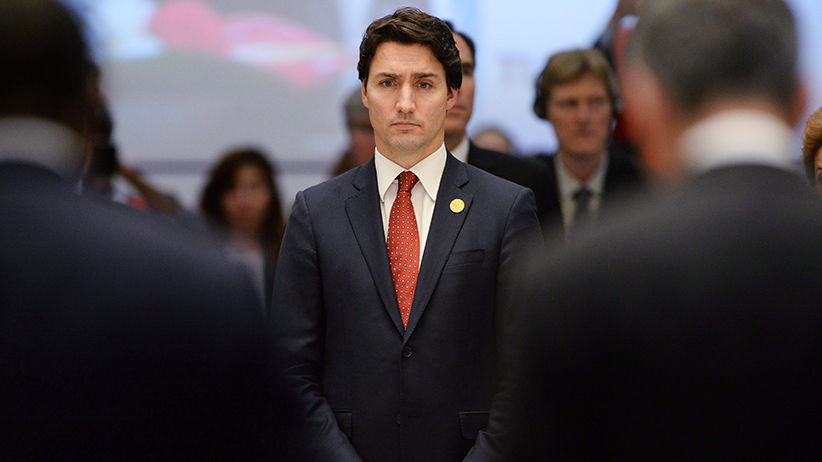Why Justin misses Stephen
The days when Stephen Harper gave Justin Trudeau opportunities to say no are over
Share

In Turkey, Justin Trudeau’s spokesman told reporters, the Prime Minister opened his remarks at a dinner of G-20 leaders by “saluting once again the courage and resilience of the people of Paris, and particularly their colleague François Hollande, who continues to show strength and resolve, and an unwillingness to succumb to terror.”
The next day, France’s president addressed the National Assembly and Senate in a rare joint session at the Palace of Versailles. He showed his strength, resolve and unwillingness to succumb by announcing a series of measures.
To Canadian ears, these two stood out: He has ordered the nuclear-powered aircraft carrier Charles de Gaulle to move to the Middle East, in order to triple French firepower in the region and to augment a sustained air campaign against so-called-Islamic State targets in Syria and Iraq. Hollande will also seek to strip French citizens who are found guilty of terrorism-related offences of their citizenship—as long as they’re dual citizens, so they have some other national connection to fall back on.
Air strikes and stripped citizenship were Stephen Harper’s policies. Trudeau campaigned against both of them. Having won, he still intends to reverse both policies.
He’s amply within his rights. Canada’s Prime Minister is no more obliged to emulate France’s president than he is to implement his own predecessor’s plans. But it’s a different proposition, isn’t it? The geometry of the situation has changed, now that Harper is no longer an unpopular prime minister against whom Trudeau can play the foil. And whatever happens in the wretched aftermath of the savage terrorist attacks in Paris, that new geometry will haunt Trudeau for some time to come.
Here’s the shift. When Harper was the prime minister of Canada and Trudeau was trying to rally the anti-Harper vote to the Liberal flag in a competitive race, “Stephen Harper” was almost always an excellent reason not to do something. This was most obvious in Trudeau’s speech to the Canada 2020 conference in Ottawa on Oct. 2, 2014, when he announced he wouldn’t support air strikes against ISIS.
If you took out all the references to Harper, Trudeau’s speech would become incomprehensible and shrink to haiku length. Trudeau asked: What should Canada do against ISIS? “The prime minister [that is, Harper] has said he would agree to Canada playing a larger role in the current mission,” he said, in reply to his own question. “He has said that the United States has requested additional support, and that he was considering the request. But he has shared no information with Parliament, and he has shared no information with Canadians.”
The rest of that speech continued in a similar vein. Harper, Trudeau said, “dissembled. Instead of being open and transparent, Mr. Harper gave his own version of events.” He remained “secretive, and with a purpose.” He had “made no effort to build a non-partisan case for war.” And on and on and on.
When Harper had MPs vote on extending the air strikes and expanding them into Syria, Trudeau’s reaction was similar. “How can we trust a government that so deliberately misleads Canadians?” he asked. The adversary most consistently mentioned in both speeches, in fact, was not ISIS, but Harper.
And now Harper is out of the picture. There will be days when Trudeau misses him. It turns out that saying no to Harper was a lot easier, for a Canadian Liberal, than saying no to François Hollande, a socialist who displayed no particular tendency toward sabre-rattling before he was elected. Or to Philippe Couillard, the Liberal premier of Quebec, who said on the weekend: “The democratic world is at war . . . When you face a mortal enemy, you must fight it with arms that match.”
Historically, there are different ways for a Liberal prime minister to adjust to such circumstances. Jean Chrétien was against military adventures when Brian Mulroney was prime minister, or when the missions were advocated by any U.S. president named Bush. He was altogether more enthusiastic when the prime minister’s name was Chrétien and the proponent was Bill Clinton. Pierre Trudeau, on the other hand, moved early in his first mandate to remove nuclear-tipped Bomarc missiles from Canada, a clear departure from the policy of his predecessor, Lester Pearson—who had campaigned on putting nukes into the Bomarcs to distinguish himself from his own predecessor, John Diefenbaker. Canada’s allies have long experience with our successive leaders’ ability to mimic weathervanes.
What Trudeau does now is up to him. The very long pauses between moments when reporters were able to put the question to him in Turkey suggested that he, his staff and ministers were giving it all a good long think. Probably he will continue with the withdrawal of the CF-18s, and probably his government will not be stripping any Canadians of their citizenship for any reason. But the new geometry will persist. The days when Stephen Harper gave him opportunities to say no are over. Now he has only friends seeking a yes. That’s harder.